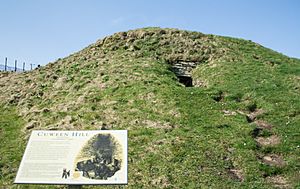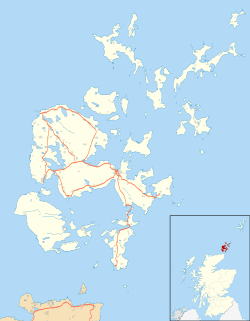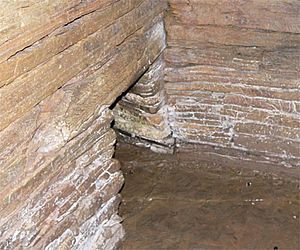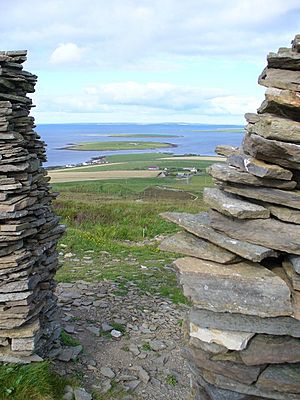Cuween Hill Chambered Cairn facts for kids

Cuween Hill, front external view
|
|
| Location | Mainland, Orkney |
|---|---|
| Coordinates | 58°59′50″N 3°06′28″W / 58.997117°N 3.107778°W |
| Type | Chambered cairn |
| History | |
| Periods | Neolithic |
| Site notes | |
| Ownership | Historic Scotland |
| Public access | Yes |
Cuween Hill Chambered Cairn is an ancient stone tomb found on Mainland, the biggest island in Orkney, Scotland. It's about 6 miles west of Kirkwall. This special place was built around 5,000 years ago by early farmers during the Neolithic period (New Stone Age). It was used as a burial site, much like a smaller version of the famous Maeshowe tomb.
Archaeologists explored the tomb in 1901. They found bones from both people and dogs, including many skulls. Later, in the 1990s, they discovered an old farming village nearby. In 2019, scientists even made a model of one of the dog's heads to see what it looked like!
Contents
Exploring Cuween Hill Cairn
The entrance to the tomb is a narrow passage. Part of it is open to the sky. You have to crawl on your hands and knees to get inside.
The main room of the tomb is built right on the rock. It stands over 2 meters (about 6.5 feet) high. It might have been even taller before explorers broke through the roof in the 1800s. Today, the roof is a modern concrete dome.
Inside the main room, there are four smaller side-rooms. These lead off from the main chamber.
What Was Found Inside?
When the tomb was first opened, archaeologists found the bones of at least eight people. Most of these were skulls. They also found many animal bones.
On the floor of the main room, there were the skulls of 24 small dogs! This amazing discovery made people think that the local families might have seen dogs as their special symbol or "totem."
The small number of human burials suggests that the tomb might have been cleaned out regularly. Perhaps only the skulls of important people were left on display.
How Was the Tomb Used?
When the cairn was opened in modern times, it was found to have been carefully blocked up. This could mean that the community closed it permanently when they stopped using it. It might also mean that tombs like this were sealed up between times of use.
Today, the cairn is looked after by Historic Environment Scotland. Visitors can still crawl through the original entrance to explore it. There is enough room to stand up inside, but it can be quite dark.
Nearby Neolithic Village
In the 1990s, archaeologists found the remains of a small Neolithic village. This village was at Stonehall, right at the bottom of Cuween Hill, below the cairn. This shows that people lived and farmed in this area thousands of years ago.
Recreating an Ancient Dog's Head
On April 22, 2019, scientists shared something very cool. They published an image showing what one of the ancient dog skulls from Cuween Hill might have looked like!
Scientists at Edinburgh University’s Royal (Dick) School of Veterinary Studies used a special machine called a CT scanner. They scanned one of the dog skulls. Then, a forensic artist named Amy Thornton used a 3D print of the skull to make a model of the dog's head.
The artist made the dog's fur look like a European grey wolf. Experts suggested this was the most likely appearance.
Dr. Alison Sheridan, a lead archaeologist, said the Cuween dog was about the size of a large collie. It had features similar to a European grey wolf. She explained that this reconstruction helps us learn about how important dogs were in Orkney during the New Stone Age. It also shows us what domestic dogs looked like 5,000 years ago.
This was the first time anyone had tried to recreate an animal from this ancient time using forensic methods.
 | Emma Amos |
 | Edward Mitchell Bannister |
 | Larry D. Alexander |
 | Ernie Barnes |




